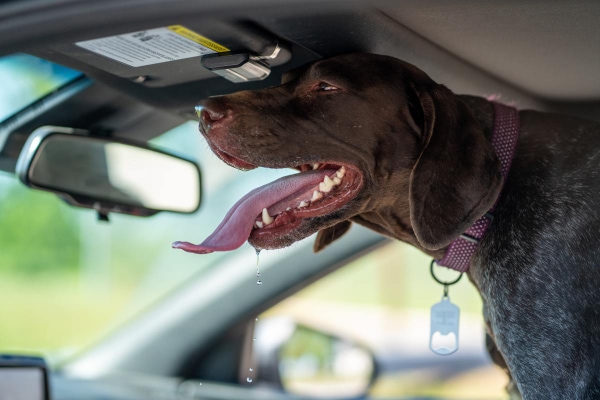Vets may prescribe meclizine for dogs who suffer from car sickness or vestibular disease (i.e. vertigo). Integrative veterinarian Dr. Julie Buzby explains how this human motion sickness medication can help your dog feel less nauseous. Plus, she reviews the dosing information, discusses the side effects and contraindications, and compares meclizine to other similar medications.

If you suffer from motion sickness, you know that feeling nauseous in the car is awful. And if you have a dog, you may be well aware of the fact that dogs can suffer from motion sickness too. But what you may not know is that there are medications that can treat or prevent car sickness in dogs, just like there are in people.
For example, meclizine, the active ingredient in human motion sickness medications like Antivert®, Simply Motion®, Bonine®, and Travel Sickness®, also works well for dogs. In fact, meclizine is one of my favorite medications for nausea and motion sickness in dogs and cats.
What is meclizine for dogs?
The medication meclizine HCl is an antihistamine that has anticholinergic, anti-emetic, and central nervous system (CNS) depressant actions. In other words, it blocks the action of several signaling molecules (histamine and acetylcholine), helps prevent vomiting, and “slows down” the brain.
Although the exact mechanism isn’t well understood, meclizine seems to be able to keep the brain from relaying messages from the vestibular system (i.e. the structures that give the brain information about the position and motion of the body and head) to the area of the brain that causes nausea, vomiting, and dizziness. This is very helpful in cases of vestibular disease or motion sickness.
What is meclizine used for in dogs?
You see, motion sickness and vestibular disease in dogs (i.e. doggie vertigo) both occur when a dog’s vestibular system (which is located inside the inner ear) becomes over-stimulated or sends inappropriate signals to the brain. Another way of looking at it is that the eyes, ears, and brain aren’t properly communicating to detect motion. This can lead to dizziness and a feeling of instability and nausea.
Since meclizine can interrupt the signal from the vestibular system to the portion of the brain that controls vomiting, it is no surprise that meclizine is useful for preventing nausea and vomiting associated with motion sickness. Plus, vets can also use it to treat nausea and dizziness associated with vestibular disease (i.e. old dog syndrome).
Signs of nausea in dogs
Sometimes it is fairly obvious that your dog is nauseous because he or she suddenly vomits. But other times, nausea can be a bit more subtle. A nauseous dog may exhibit symptoms such as:
- Retching or gagging
- Vomiting
- Excessive drooling or licking the lips
- Panting
- Walking with tail tucked and back arched
- Decreased appetite
- Shaking or trembling
- Appearing anxious or uncomfortable

If your dog is showing these signs in the car, he or she may suffer from motion sickness. While not an emergency, your dog (and your car interior) would probably appreciate it if you had a conversation with your vet about whether meclizine (or another medication) can help your dog’s car sickness.
On the other hand, if your dog is showing those signs seemingly out of the blue, and is also circling, being a wobbly and off-balance dog, or experiencing rapid repetitive eye movements (i.e. nystagmus), he or she may have vestibular disease. In this case, you should make an appointment with your vet immediately. That way he or she can differentiate vestibular disease from a stroke in dogs or other problems, and make a plan to get your dog feeling better.
What is the meclizine dosage for dogs?
After examining your dog, your veterinarian will help decide if meclizine is the right choice. If so, he or she will go over dosage instructions and how to give your dog meclizine.
As discussed, meclizine is a human drug that vets can safely use “off-label” in dogs or cats. It is available over the counter, but some forms might contain other drugs or ingredients that aren’t safe for dogs. Therefore, your veterinarian will typically give you a prescription for meclizine or very specific instructions about what to purchase and how to give it to your dog.
The instructions on the prescription will include:
- Whether your dog needs 12.5 mg or 25 mg meclizine tablets
- The number of tablets to give your dog by mouth
- How often to give your dog the meclizine
- Any relevant precautions or other instructions
Your vet will determine the exact meclizine dose based on your dog’s size and the reason your dog is taking meclizine.
Giving your dog meclizine for motion sickness
If the goal is to reduce your dog’s car sickness, your vet may give you the following guidelines:
- Give your dog the meclizine about 30 to 60 minutes before travel
- Expect the anti-nausea effects to last three to six hours
- You can give the meclizine with or without food. (Giving it with food is a good tactic for dogs who won’t take pills, but remember that for many dogs who develop car sickness, it is best to avoid large meals before traveling.)

Typically, dogs who get car sick while traveling can safely take meclizine long-term (especially since most dogs aren’t taking it every day).
Giving your dog meclizine for vestibular disease
If your dog is taking meclizine for vestibular disease, you will likely be giving the medication daily. Your vet will tell you how often you can give your dog meclizine—usually either once or twice a day. Plus, your vet will instruct you about how long to give the meclizine for your dog’s vertigo. Sometimes your dog will only need meclizine for a short time. But in other situations, your dog may end up being on meclizine long-term.
What to do about missed doses
If you accidentally miss administering a dose of meclizine to your dog, give the prescribed dose as soon as you remember. Then, wait the proper amount of time between the doses before you give the next. Or, if you remember a dose was missed close to the time when your dog would normally receive a dose, just wait until the next dose is due.
As always, if you are unsure what to do, please call your veterinarian. Never give your dog two doses at once because it could put your dog at increased risk for potential side effects or a meclizine overdose.
What are the side effects of meclizine?
However, even at proper dosages, meclizine for dogs can occasionally cause side effects. Some of the possible adverse effects include:
- Increased sleepiness or drowsiness
- Hyperactivity
- Dry gums
- Increased heart rate
- Dry eyes
If your dog experiences any of these side effects, please stop giving the medication immediately. And contact your veterinarian or a nearby emergency clinic for further instructions. Most side effects will wear off in 24 hours, but it is best to consult your veterinarian any time your dog has an abnormal reaction to a medication.
In cases of a meclizine overdose, your dog is likely to show the side effects mentioned above. Plus, sometimes an overdose may result in more serious symptoms like seizures in dogs or respiratory depression. If your dog accidentally gets into meclizine or receives an overdose, please contact your veterinarian or make an emergency vet visit immediately.

Are there dogs who can’t take meclizine?
If your dog experiences any side effects, meclizine may not be the best medication choice for him or her. Additionally, there are some other situations where meclizine may be contraindicated or should be used with caution. They include:
- Pregnant dogs (meclizine caused birth defects in laboratory animals)
- Nursing dogs (may reduce milk supply)
- Enlarged prostate in dogs
- Dogs with spinal disease who are having trouble urinating
- Severe heart disease in dogs
- Dogs who are taking fluoxetine (Prozac®), metoclopramide, cisapride for dogs, or other antihistamines, tricyclic antidepressants, or sedatives
- Bladder cancer in dogs or urinary obstruction
- Glaucoma in dogs
- Liver disease in dogs (blood levels of meclizine may be higher due to decreased breakdown by the liver)
- Dogs who are undergoing allergy testing (since meclizine is an antihistamine it may interfere with test results.)
- GI obstruction
- Seizure disorders
Before you start your dog on meclizine on your own (or any other medication), please consult your veterinarian to make sure it is a safe choice for your dog. Also, ensure that you tell your vet about any medications or supplements your dog is currently taking.
Dramamine and other alternatives to meclizine
If your vet determines meclizine is contraindicated or thinks a different medication may work better for your dog’s situation, he or she will talk to you about some other options. They may include:
Dramamine®
The drug dimenhydrinate is the active ingredient in the original formulation of Dramamine. However, there is also a Dramamine® All Day Less Drowsy, which actually has meclizine as the active ingredient. And Dramamine® Non-Drowsy contains ginger as the anti-nausea agent. Thus, all versions of Dramamine are not the same. For the purposes of this discussion, we will talk about the original Dramamine (i.e. the one that contains dimenhydrinate).
The dimenhydrinate version of Dramamine is an antihistamine that acts very similarly to Benadryl for dogs or meclizine. By reducing the brain’s activity and targeting the signals that cause nausea, it can help reduce nausea from car sickness or vertigo.
Dimenhydrinate is safe for dogs but tends to have more sedative properties than meclizine. Sometimes this is ok if you want your dog to sleep the drive away. But other times you may want something that allows your dog to remain more alert. This may make meclizine or Cerenia a better choice. Additionally, dimenhydrinate is also less effective than meclizine in some cases.

Cerenia®
Cerenia for dogs (i.e. maropitant citrate) is another common anti-nausea medication for dogs. In fact, it is the first FDA-approved veterinary anti-emetic (i.e. drug to prevent or treat vomiting). Like meclizine, it works by blocking signal transmission in the brain. More specifically, Cerenia prevents substance P from binding to the NK-1 receptors that are responsible for making the dog vomit.
I love Cerenia and recommend it often to my patients. It is highly effective and does not cause sedation. However, Cerenia can take longer than meclizine to work (up to one to two hours). Also, Cerenia tends to be avoided in patients with liver disease. In some cases, though, these dogs may still be able to safely take meclizine.
Ask your vet about meclizine
As you have discovered, meclizine has many benefits for dogs who frequently get car sick or have vertigo from vestibular disease. It is generally safe and well tolerated, takes effect quickly, and works well for many dogs.
If you think your dog might be feeling nauseous, please make an appointment with your vet. Feeling sick and nauseous isn’t fun for anyone. But if the cause is motion sickness or vestibular disease, meclizine might be the perfect solution for you and your furry friend!
Has your dog taken meclizine?
Please share your experiences below.


My pup got recently diagnosed (assumption) with Vestibular disease. She has floppy ears which makes me wonder about inner ear infections that cannot be seen. We are heading to vet as discomfort is huge with the head tilt and wobbliness.
What kind of harness is recommended? We use a harness only and no collar but need more specifics as it will help in buying for my pup
Hi Anu,
I am sorry your pup is dealing with the effects of vestibular disease. I am glad you planned to have your vet do a thorough evaluation to ensure there are no other issues contributing to the situation. There is no specific harness recommended for this condition. Some find it helpful to get a harness system that allows you to offer support to the hips/rear legs as well as the chest and front legs. The harness I have had the best experience with for supporting the rear end is the Help ‘Em Up Harness. Hoping all is well and you are seeing an improvement in your pup. Best wishes to you and your sweet girl.
My dog was fine on Friday I came home from work he looked paranoid his eyes were twitching side to side and he was wobbling he couldn’t walk. I took him to the emergency vet they diagnosed him with vestibular syndrome. they gave me a couple of gabapentin to give him and four tablets of mesclazine. they told me an approximately 72 hours he should start showing signs of improvement. he is not. Will he get over this or will he get to the point that unfortunately I have to put him to rest? he is my life my everything. his name is Bubba and he’s 13 years old He’s a lab mix. I got him from the rescue when he was approximately 6 months old. help I’m scared I don’t want to lose him.
Hi Kathy,
I understand your concern for your pup, and I am sorry he is struggling with the effects of vestibular disease. Most dogs do show improvement within the first few days, but others just need more time. Some dogs will start to improve in weeks and others need months. It truly is just a waiting game. Of course, without examining your boy myself, I cannot guarantee there are no other issues contributing to his condition. I will attach links to other articles with more information. How is Bubba doing today? Hoping things have improved and he is on his way to a full recovery.
1. Vestibular Disease in Dogs: Doggy Vertigo
2. 10 Tips and Exercises for Dogs with Vestibular Disease
3. How to Feed A Dog With Vestibular Disease: A Comprehensive Guide
Hello,
my beautiful 16 year old girl has episodes of vestibular disease, but we only gave cerenia until now. We were wondering if cinnarizine would also be a good choice (we live in Europe) and if that works the same as the Meclizine. Both meds are available here over the counter.
We use a full body harness, which has two straps under her body, so the rear strap which goes under her belly, supports her lower back more.
Hi Azor,
I am sorry your senior girl is suffering from the effects of vestibular disease. I do think it would be good to discuss adding one of these medications to your dog’s treatment plan with your vet. While both are in the antihistamine family, these medications do act in different ways. I am not sure which would be the best choice for your dog’s specific medical needs. Your vet would be able to guide you in this decision-making process. It sounds like you have things under control and are doing a great job. Here are links to other articles just in case they contain some additional information that could be helpful:
1. 10 Tips and Exercises for Dogs with Vestibular Disease
2. How to Feed A Dog With Vestibular Disease: A Comprehensive Guide
3. Vestibular Disease in Dogs: Doggy Vertigo
Wishing your sweet girl the best and praying for a full recovery. Keep up the good work!
My 14 year old Pom has vestibular disease and it can come on without warning. When the episode starts, she appears to be unable to walk as if her back legs won’t function. She cannot or will not put any weight on her back legs. She also presents with a head tilt and rapid eye movement. As soon as I recognize the episode for what it is, I give her a 12.5 mg Meclizine tablet (in a pill pocket). I then pick her up and carry her until the episode subsides (typically 3 hours). Once it subsides, she returns to normal function within a few hours. It appears the Meclizine works. These episodes come and go without warning. She may go a month without an episode or she might have 3 episodes in a week. Totally unpredictable. Fortunately for her and me, they typically only last about 3 hours.
Hi Alan,
I am glad you have found what works for your sweet girl, and that it offers relief so quickly. Her case is not what I typically see with vestibular disease and makes me wonder if something else isn’t playing a role in her symptoms. Thank you for sharing your experience with us. Wishing you both many happy days ahead.
My senior beagle recently experienced a bout of Old Dog Vestibular Disease, and our vet recommended Meclizine to address her nausea/motion sickness. I found that it worked well, and appreciated being able to purchase this med “over the counter.” It was a bit of a challenge to get her to take the medicine, as she did not have much of an appetite, and would not eat anything. I dissolved the Bonine pills in a very small amount of water and used a liquid medication ‘syringe’ to administer the dissolved Meclizine.
Hi Wendy,
This is great advice and something I routinely have my clients do as well. I am glad the Meclizine seemed to help reduce your pup’s motion sickness. Wishing you all the best. Thanks for sharing!
Meclazine and Cerenia have been a godsend for my 12 year old pit mix, who has vestibular disease. The first dose changed her from miserable and vomiting under the bed to a dog happily eating her dinner and sleeping on the couch. It doesn’t stop the dizziness but it definitely stops the nausea, which is the most important part for her comfort. If your dog has been diagnosed with vestibular issues, be sure to keep a box of meclazine on hand! We also use Cerenia for the really bad episodes with great success. FYI to those pet parents who are just starting down the Vestibular disease road – episodes come and go, so you need to keep two things on hand: Meclazine/Cerenia and a good harness for special needs dogs that supports the front AND rear sections of a dog (not a regular walking harness) and gives you a mid-body handle for easily helping them navigate until their balance comes back. Since grip is also an issue with vertigo, we are ordering her some toe grips so we don’t have to have towels covering the uncarpeted spaces in our home. I know I was desperately searching for info on what to do do when my dog had her first episode of vestibular disease, so I hope this helps some other pet parents!
Hi Tara,
These are such great suggestions! Thank you for sharing your experience and offering much needed advice. I am certain others will find this extremely helpful when trying to navigate this tricky path. I am glad your sweet girl is doing well and think you will be very pleased with ToeGrips. Feel free to let me know what you think once you have a chance to try them. Best wishes to you both for many happy years to come!
Thank you for the information. Our boxer was just diagnosed with Vestibular. He seems to be having a bad bout of it right now. Initially he was prescribed at emergency vet Meclizine then our regular vet said he could do Dramamine. That does not seem to be working as well. I may go pick up Meclizine.
Hi Chanin,
I am sorry your Boxer is struggling with vestibular disease. Here are links to other articles on this topic that may be very helpful over the next few weeks. Praying your sweet boy will make a full recovery!
1. Vestibular Disease in Dogs: Doggy Vertigo
2. How to Feed A Dog With Vestibular Disease: A Comprehensive Guide
3. 10 Tips and Exercises for Dogs with Vestibular Disease